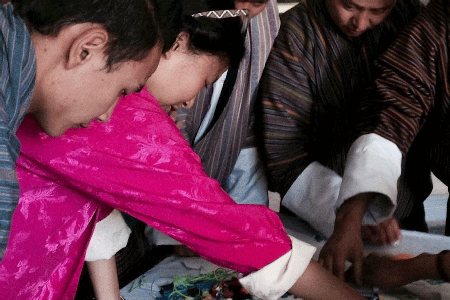New Graduate Program in Civic Media Launches
Starting in Fall 2016, Emerson College’s Engagement Lab will launch an intensive 12-month residential master’s degree program in Civic Media, Art & Practice (CMAP). Prospective students can apply now to the graduate program, which focuses on the emerging field of civic media.
Established in 2010, the Engagement Lab focuses on the development and study of games, technology, and new media to enhance civic life. The launch of the CMAP graduate degree taps into the Lab’s expertise in civic media and comes at a time when there is growth in employment opportunities in the multifaceted space of design, study, and implementation of civic media in government, community media, public media, non-governmental organizations, digital agencies, and cultural organizations.

Boston Coastlines: Future Past, a “walking data visualization” project at Emerson's Engagement Lab.
According to Associate Professor of Visual and Media Arts and Director of the Engagement Lab Eric Gordon, technology, media, and civic life are converging in extraordinary ways and organizations and activist groups are striving to understand and utilize that convergence. “With this in mind, we designed the CMAP graduate program as a ‘think and do’ lab, where students are immersed in critical debates about media practice, while collaborating with outside partners from all over the world to create solutions to real-world social problems.”

Civic media workshop in Bhutan held by Emerson Colllege's Engagement Lab.
In contrast to traditional course work, internship, and capstone/thesis models, CMAP master’s students select their community partners from the outset and collaborate with those organizations until the end of the one-year curriculum. Seminar courses that focus on theoretical and historical texts will be taken in combination with studio courses, concentrating on the design and implementation process of creative works.
“Whether it’s creating a digital campaign to encourage action for a cause or designing an interactive game to gain feedback on a city building project, working in civic media opens opportunities to inform political, social, or cultural change through new media technologies,” said Associate Professor of Communication Studies and Associate Director of the Lab Paul Mihailidis. “The range and reach of projects is endless, which makes a career in civic media unique in its versatility.”
Supported by a core of nine faculty members/Engagement Lab fellows from across the College, including Gordon and Mihailidis, students enrolled in the CMAP graduate program will prototype and test ideas; create art, media, and design products; learn production techniques related to their project; and innovate with different approaches to a problem.
The final master’s project will be a design book and a creative project co-designed with their chosen organizational partners and positioned for implementation. Students will support this creative work with a written thesis.
In the summer, graduate students will have the option to participate in the Salzburg Academy of Media and Global Change, which is a three-week academy for university students all over the world. CMAP students serve as teaching assistants in Salzburg and work with undergraduates in guiding their own rapid prototyping of civic media projects. Giving CMAP students the opportunity to teach others what they have learned is core to the pedagogical mission of this graduate degree program.
To request more information, or to apply to the CMAP graduate program, visit the Enrollment webpage.
Categories